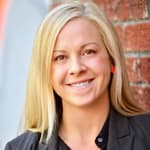Propeller recently had the pleasure of attending the Northern California Association of Change Management Professionals Annual Symposium, a San Francisco Bay Area event that provides a venue for the change leader community to share best practices, meet fellow change makers, and walk away with innovative ideas to help lead others. Rachel Crocker, Propeller’s former People & Change Practice Director, who is leading the growth of our San Francisco practice, represented Propeller on a leadership panel to discuss the latest trends in change management. We wanted to share her thoughts and ask a few follow up questions.
Where do you see people & change trends headed?
One of the things I’m hearing from business partners is that there’s a lot of interest in building change skills as a capability. Leaders I’ve worked with have said, “how can we, as a company, think about change differently and make it tangible?”. Sometimes change can seem nebulous and theoretical. Our clients are looking for culturally specific levers to pull and for ways to make changes sustainable. Building strong internal capabilities allows for both repeatability and sustainability.
What about opportunities for the future? What do you see as an area that People & change can continue to grow into?
When I think about opportunities, the first thing that comes to my mind is better integrating data into both our decision-making processes and understanding of long-term sustainability. We have a lot of disparate opportunities to both utilize and source data. Change leaders can better define measures of success earlier in a change effort and with more detail. The second part of integrating data into our decision making is ensuring that it’s both a valid and reliable source of information. I’m excited to see this school of thought advance in the next few years as we start capitalizing on the data we already have and better understand how to utilize it.
What advice would you give to someone pursuing a career in people & change?
Empathy and self-awareness are essential when working with human beings, especially during a period of change. Seeking to understand the problem from the client’s perspective helps us approach the problem more holistically. Part of seeking to understand is also being naturally curious and interested in solving problems. Don’t be afraid to ask probing questions and be sure to approach them from a lens of empathy and self-awareness. Along with empathy and awareness, grit is also vital. As change managers, we’re the ones raising the risk flag and you must not be afraid to act. Getting your hands dirty and identifying the source of the deterrent to sustainable change is a large part of the role.
WHAT WERE YOUr BIGGEST TAKEAWAYS FROM THE ACMP NORCAL SYMPOSIUM?
The ACMP NorCal Symposium was a great opportunity to hear relevant speakers and stories and network with interesting change leaders facing complex problems. What keeps resonating for me is that although we have different job titles, roles, and experiences, our goal of ensuring adoption and sustainability solidifies our shared identity as change leaders. I found significant value in hearing about the disparate approaches that the featured speakers used to inform trainings, better understand customer journeys, and share similar experiences (Legos!) to access a common truth.
If you’d like to read more about change management, be sure to check out our case studies and other blog posts. You can also take our free and brief 12 question change management assessment quiz to understand the risks and impacts of your specific change.

Hands-on and fearlessly curious, Propeller alumna Rachel Crocker values engagement above all else. Her love of storytelling (perhaps inspired by her affinity for TED Talks) is evident in her business communications, and she’s able to bring even the most formidable concepts down to earth. From anticipating operational snafus to experimenting at home in the kitchen, Rachel is living a life that constantly keeps her challenged and stimulated. She holds an MBA from Marylhurst University and a bachelor’s degree from Oregon State University.



